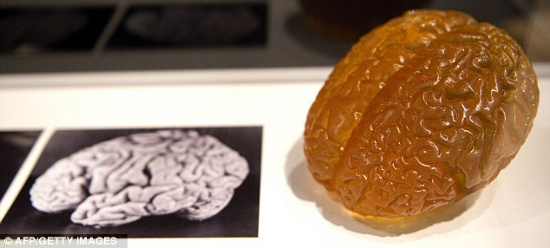The artificial brain project receives 2 billion euros
French scientists on Jan. 27 said that the study of graphene and neurological chemistry of the brain will receive funding of 2 billion euros ($ 2.68 billion) of investment from the Commission. Europe.
These two areas have benefited from the European Union's Future and Emerging Technologies (FET) program.

Brain model of Albert Einstein's genius on display in London (Source: AFP)
The French National Center for Scientific Research (CNRS) says the amount of money, up to $ 1 billion for each initiative, will be spent within 10 years.
Graphene, discovered less than a decade ago, is a network of carbon atoms, linked together in hexagons and forming a long sheet of webs. It is said to have enormous potential, thanks to its superconducting properties, very hard mechanically and has optical transparency that transcends all other materials.
Meanwhile, the Brain Project seeks to simulate the activity of brain cells, chemicals and brain activity in a supercomputer. The goal of the program is to help better understand brain activity and development.
The project hopes to find new treatments for diseases such as Alzheimer's and enhance artificial intelligence.
- France invested over 2 billion euros in space research in 2014
- Artificial brains are capable of counting and reasoning
- EU spent 28.3 million euros for bird flu research
- The ambition to create artificial brains works faster than the human brain
- Raising an artificial 6-month-old brain, for the first time, a baby-like brain wave is emitted
- First map of brain activity
- Spanish money has drugs
- EU discusses satellite navigation project
- Artificial brain - the door to open life
- 'Human brain' for the computer
- France spent 1 billion euros to develop nuclear power
- It sounds crazy, but this hundred billion dollar project could save the Earth
 Green tea cleans teeth better than mouthwash?
Green tea cleans teeth better than mouthwash? Death kiss: This is why you should not let anyone kiss your baby's lips
Death kiss: This is why you should not let anyone kiss your baby's lips What is salmonellosis?
What is salmonellosis? Caution should be exercised when using aloe vera through eating and drinking
Caution should be exercised when using aloe vera through eating and drinking